Rear Admiral Alex Burton, ex-commander Maritime Forces, said the ability to “fight and win on the front line” was being affected by defence spending issues.
Rear Admiral Burton, who quit the armed forces last autumn, told the BBC:
“If you do not spend more on defence than we currently are as a percentage of GDP, then we put at risk the fact that we are currently a credible military power, and from that we put at risk our position on the global stage.
The challenge is ensuring that we’re still able to [fight and win] not just over the next 12 to 18 months, but that we’re able to do that over the next 10 to 20 years.
As a sovereign nation – an increasingly sovereign nation – I think that’s critically important. Our insurance policy, I believe, will be compromised and our ability to stand up for our beliefs and protect our interests will be weakened.”
Recently, the International Institute for Strategic Studies claims that Britain spent 1.98 per cent on defence in 2017 — the same figure reported for the previous year.
However, according to NATO, the UK spent 2.14 per cent of GDP on defence.
IISS Director General John Chipman said:
“Only two European Nato states – Greece and Estonia – met the aim to spend 2 per cent of their GDP on defence, down from four European states. The UK dipped slightly below this at 1.98 per cent, as its economy grew faster than its defence spending.
Nonetheless, the UK remained the only European state in the world’s top five defence spenders. If all NATO European countries were to have met this 2 per cent of GDP target, their defence spending would have needed to rise by over 40 per cent.”
IISS is a a leading authority on global security, political risk and military conflict. The Military Balance 2018, the annual assessment of global military capabilities and defence economics from the IISS suggests that European states are ‘increasingly conscious that the world is a dangerous place.
Military capabilities on the continent have, however, become hollowed out as states first reaped a post-Cold War peace dividend and then made defence a discretionary activity in the wake of post-2008 austerity’ say IISS.
The report states:
“Our figures show that Europe’s growing defence investments are still not fully geared towards preparing European armed forces for future challenges. For most, defence R&D remains limited. Indeed, in 2016 three global defence firms – BAE, Boeing and Lockheed Martin – each spent more on defence R&D than all but two European states. Only France and the UK outranked them. And allocations for other costs, like military pensions, remain high in some states.
In 2017 for instance, military pensions absorbed over 33% of the Belgian and Portuguese defence budgets.”
The report discusses moves to recover and rebuild capability have been given impetus by stronger US pressure on European states to do more for their own defence, but claims they will take time to bear fruit.


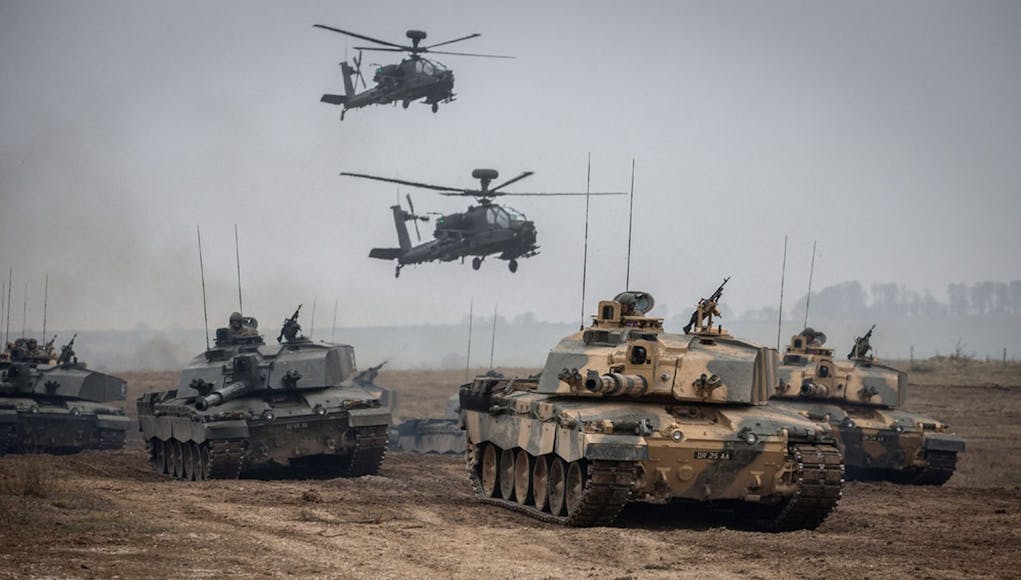

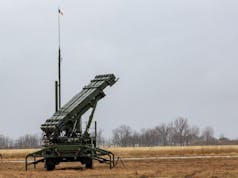
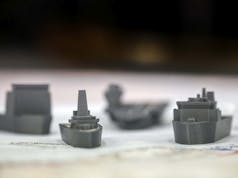
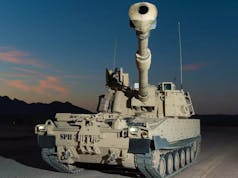

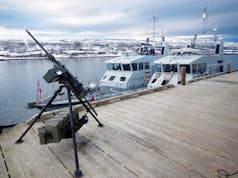
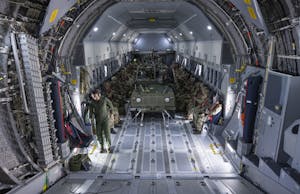









[…] post UK ‘could lose status as credible military power’ without defence spending increase appeared first on UK Defence […]
We really need to get away from this 2% figure, it has become a distraction. Even if for arguments sake we accept the UK is currently spending 2% of GDP on defense, so what? It clearly isn’t nearly enough.
Agreed, but it does have its uses. If all of our European allies met that 2% target, suddenly our own forces aren’t spread so thinly trying to cover the vast land border between Europe and Russia. We could concentrate on the areas we can have the most impact, e.g. sea power, amphibious capability, special forces, etc. An expanded and well equipped fleet, with a carrier for organic air cover and additional land-based support, and the ability to land a large force of marines backed up by an overall smaller but better equipped army, thats what both we and the EU… Read more »
Completely agree, first the nation needs to agree what it expects of its military which is mainly a political question. When we have that answer we need to agree what is needed to achieve then and only then do you get to the point of agreeing a settlement. If the settlement cannot be achieved you go back to the start.
It’s a bit bonkers starting with the figure you would like to spend and going from there. That’s how you buy a car not defend a nation.
I agree – up to a point. The figures themselves are misleading as they dont tell the full story. I think most people would be horrified at the housing conditions our service people and their families are expected to live in – and would also be surprised at the wages for some of the really important jobs (like engineers – not general). However, the public (including me) need to understand how much is being spent and on what and I dont think government does a great job of this. Defence is a great employer within some of the poorest parts… Read more »
I have always wondered about this mystical 2% figure. We know that active operations costs don’t come out of the core defence budget and so if you add the costs involved with us being at war for the last multiple decades, i wonder what the real figure is. Ultimately our credibility has already been destroyed by iraq/afgan when the US had to help us out numbers wise. There is no question that Russia wouldn’t dare poison someone on US soil, but is playing it coy when it comes to UK, since they don’t consider us a threat. That combined with… Read more »
In the medium term the carriers will help rebuild some credibility, but first we have to get past the further loss caused by them having to carry US jets for the early years and no doubt being escorted by US ships that will be required as part of the deal.
Large quantities of poor quality or outdated equipment is a poor idea. Look at Iraq, where Saddam had nearly a million troops, thousands of tanks, and hundreds of aircraft. It was almost all of it was older Soviet equipment that got hammered into dust when it went up against the modern, better trained coalition forces. For the most part, ignore troop numbers as a measure of strength. Focus on the capability a country has, including training, logistics, etc. Case and point, India and China. Both have developed large, powerful fleets, but currently lack the logistics chain of support ships and… Read more »
Though I will likely have TH troll go on about fantasy fleets and armies, this is what we need. Army: The capability and funding to deploy a full division and all the support it needs abroad indefinitely. It’s recently been said that it’s unlikely we could even do this with the cuts. Navy: 30 warships. This isn’t a stretch, it was only in 2000 that we had such numbers. This would provide enough escorts fit a carrier battlegroup and for the Royal navy to fulfill all it’s other obligations at the same time. Air force: This I’m not as sure… Read more »
BS
I agree we should not obsess about 2 or 3% but what do we need to spend to achieve the required capability. Certainly RN personnel numbers need to go up by 4000-5000 Recruitment but crucially retention has to improve, accomodation, training and making the armed forces personnel feel vital to the countries welfare is essential. The standard of armed forces accomodation is currently below acceptable standards. Much needs to be done. 26+ escort warships. Revert cut to type 26, numbers and build 13. Type 31s need to be built to at least 8 ships. Then we must retain Albion and… Read more »
My thoughts – I’m sure that ‘defence’ spending will increase. But much of the increase may not go into conventional hardware areas. What I would expect is greater emphasis on countering Russian activity in cyber, propaganda, political destabilisation and state sponsored terrorism. The RN does need more hulls and a manpower increase and the new frigates need to provide accomodation and rotas that retain career sailors in the navy. We do need at a minimum to maintain army numbers and sort out the vehicle and tank programs. And the RAF should get more fast jets to continue the war of… Read more »
2% is fine but pensions and development of new nuclear (or other radical or step change) technologies should be removed from the budget.
The defence budget should be for maintaining and Manning the systems required to establish and protect our sovereignty. Soldiers’ welfare and tangential research should come out of other pots of money.
exactly. and that is how we can say we hit the 2% routinely. by factoring in the pensions. the DWP should take military pensions on, freeing up money to properly kit out Pte Smith so he doesn’t have to spend hundreds or even thousands of his own money on kit that is comfortable, work or simply is readily available. if those of you who have never served realised how much personal contribution is made for kit, particularly in the infantry, you’d be appalled. it wouldn’t happen at a civilian company that turns a profit so why it’s an accepted part… Read more »
Why remove the cost of the nukes from the budget, that makes no sense. Our nukes are ultimately one of our best defence items and so should be include like any other military equipment. The fact they weren’t included originally is just an oddity. What we need is a real linked up strategy that is not just defined on budget. What threats do we realistically have and how can we counter them in a cost effective way. Russian interfering in elections etc is such a red herring. They spent a few thousand on social media adverts and posts. Something that… Read more »
personally I think the budget is adequate. The issue is where we choose to spend the money. We are trying to mimic the US but on a smaller scale, rather than taking a look at what we can realistically achieve and focusing the spending on specific useful capability. We are currently jack of all trades master of none.
Masters of mine clearance
not for long, based on the rate that the mine hunters are quietly going out of service with no replacements planned.
If speaking about defence planning in terms of percentages is a red herring, then speaking about numbers of platforms without threat analysis is another. What is needed is context. We need to be able to clearly state what we want to be able to do. Then we can discern the numbers of platforms we need and, finally, what funding will be necessary. We have to plan for war with Russia if anything else is to make sense. Grasp the nettle. Realize that Russia is our only likely significant opponent. Calculate what we need to be able to defeat Russia at… Read more »
I’m not sure what the priorities should be Nick although I think they are coming together but I do agree with you 100 per cent about what you have called context. How can we just lurch from one spending crisis to another without a foreign policy which says these are the things we need to do and then pricing them out.
we can’t realistically take on Russia alone, and so looking at what it takes to fight them on the 4 theatres is just spreading our resources too fine. We need a realistic assessment of western European assets, and then plan around providing a part of the puzzle.
Right now we plan like we will need to fight on all fronts alone and so buy top end assets to cover all 4 theatres, which is not even vaguely realistic.
We have to come to the evidence that mothballing the fleet in the 70-80-90-2000 and retreating from the Asia Pacific theatre…Was the biggest strategic mistake.. I would of sooner given up nuclear weapons then given Hong Kong back too China.. Now China is on the rise building 2 more aircraft carriers bigger than our own, with a fleet too match. What the hell for.. to patrol the seas to spread peace and democracy… I think not.. Russia is rebuilding it’s forces.. perhaps not in ships but in strategic weapons too which we have no defence, and neither does the US..… Read more »
If I was china i’d be building a big fleet right now also.
Andy the Chinese are already doing that, within 10 years they will have some 30 nuclear powered attack or ballistic subs+ dozens of conventional powered ones, 3 aircraft carriers (no not superior to QE but the last 2 either in build or building are almost comparable) Talk of the Chinese building a nuclear powered super carriers are real. They might of completed 1-2 of these within the next 10 years. In terms of surface warships their newest destroyer types are very potent and actually a direct comparison to Arleigh Burke and the best the Japanese and South Koreans can build,… Read more »
We are in the era of the arms race, similar to what we saw pre WW1. the difference is the other nations aren’t racing to counter the British empire this time, they are racing to counter the US and its interfering in their area of influence. Historically arms races have always ended up badly, so let’s hope history does not repeat itself. Either way Britain is unable to counter China today, it’s just too far behind firepower wise and also of no interest to China. Gearing up to fight an opponent that you have no chance of winning against is… Read more »
Good sense! Well said!
Steve the UK needs to rearm and increase defence capability in terms of numbers, weapons, platforms so that we meet our defence commitments and support our allies if they are attacked.
Article 5 of the NATO treaty means all NATO should commit to this requirement.
Problem is the whole of the EU (UK included) has spent the last 20 years harvesting the peace dividend meanwhile Russia has slowly but steadily under Putin been working to rearm and threaten and undermine NATO via asymmetrical warfare and niche areas like area denial weapons and saturation cruise, ballistic and hypersonic missile attack.
Russia has rearmed and modernised but is still not capable on taking on western Europe in a straight conflict.
I guess it depends what you mean by that. Russia could invade Georgia, Estonia or other former Soviet countries now allied to the west. What would we then do about it or could we even prevent it? Nothing and no I would say. Russia may be lacking in certain areas but they have the numbers on the ground with enough aircraft to hold seized areas.
They couldn’t though launch a full offensive against the west, but that is highly unlikely anyway. We are all too reliant on one another. We need their gas, they need us to pay for it.
this is the reality and also what happened with Nazi Germany. how many countries are invaded before we are forced to counter the threat. I suspect at least 1 or 2 eastern bloc NATO members, could be taken without us getting involved.
Yes and it could be done Crimea style, with little green men and under the guise of protecting native Russians. By the time we could counter any of those moves it will be too late. They annexed Crimea and the west did little about it bar sanctions that were not very severe. We still bought their oil and gas.
How quickly could we reinforce the defences of the countries you are thinking of? Do we need a BAOR approach?
UK foreign and defence policy is proving to have made good choices in cultivating KSA and the Gulf states. We have acquired naval bases and Typhoon orders. We are protecting the supply routes of Qatari gas imports and stabilising the region.
Firstly , I think the political mood music re defence spending is changed. I believe there will be an imcrease in spending, largely targetted at cyber and propaganda capabilties but I do see at minimum a firming of spending on conventional forces; closing of manpower gaps and definite commitment to capital projects. I would like to see at a minimum an increase in RN manpower and fleet, no reduction in army numbers and recapitalisation of army vehicles and armour. Secondly; ironically since Salisbury I would say the UK is now playing a pivotal post imperial role in world affairs as… Read more »